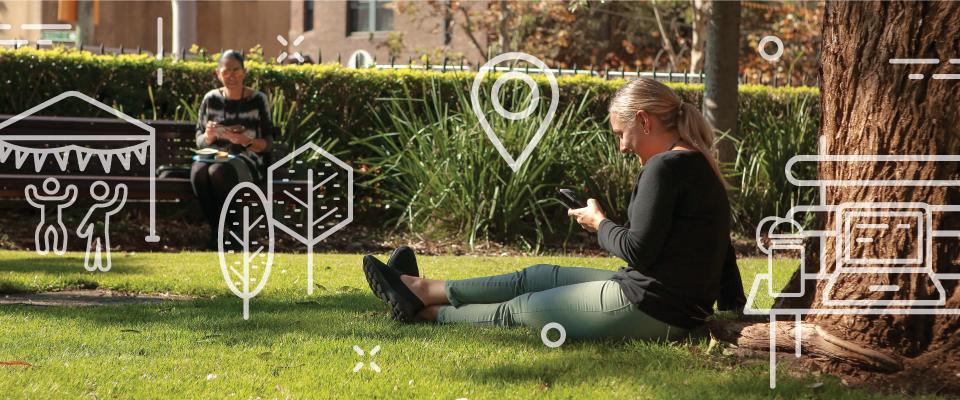About Us
The UNSW Urban Growers is a staff and student group focused on creating and maintaining new green food growing spaces across the UNSW campuses for hands-on practical classes in food security, law, engineering, design and medicine, while promoting opportunities for food related research in these areas and was officially launched on 12 November 2019. Our members come from various parts of the University, including Art and Design, Arts and Social Sciences, Biological Earth and Environmental Sciences, Built Environment, Engineering, Environment and Society, Estate Management, Law, Public Health and Community Medicine, Wellbeing, as well as students and staff from Arc @ UNSW. We have three gardens across the campus in the Law building, the Samuels building as well as the Barker St Carpark.
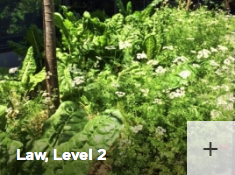
We planted our first garden in 2017, in the internal courtyards on Level 2 of the Law building just above the Law Library. The courtyards feature garden beds which are used for teaching urban agriculture in elective courses such as People, Land and Community and Food Law.
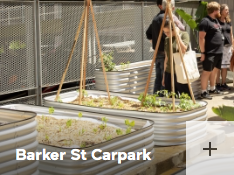
Our first campus-wide Teaching and Research Garden is located on the north east corner of the Barker St Car Park. It was established in 2019 with funding from the Scientia Education Academy and the Grand Challenge on Rapid Urbanisation. It features seven raised beds that will be available to all UNSW staff and students for research and teaching from 2020.
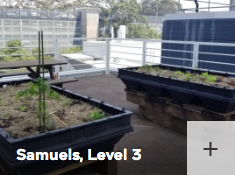
This new food garden was established on the Level 3 Balcony in Samuels building by the School of Public Health and Community Medicine in 2019. We supported the creation of this new space by planting two large vegetable pods where we are growing cherry tomatoes, green beans, lettuces and herbs. This new space makes for a more natural setting for enjoying lunch, having meetings or simply switching off for a brief moment or two.
Benefits of Urban Growing
Teaching
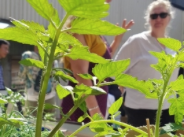
Food growing is incorporated into a number of courses at UNSW, with the opportunity for it to be adopted in many more. Students can plant vegetables as part of their research on urban agriculture, intellectual property and food security. Students can also grow plants for practical classes in biology and ecology, as well as learning about concepts related to public health nutrition, food security, obesity and chronic disease prevention and management.
Research

There is much food-related research that can be done at UNSW but some requires growing space. Staff in WaterGUM research the ways in which plants, including edibles, can be used to clean stormwater and wastewater in cities. Staff in the Built Environment explore the planning, design and ecosystem services aspects of food growing, to inform our understanding of and capacity to positively intervene in our rapidly growing and densifying cities.
Wellbeing
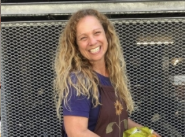
When we are grounded in nature, our physical and psychological health improves, the immune system is boosted, and there are even benefits for our long-term health. When we get outdoors and exercise around a common goal, we create opportunities for social connection which brings further benefits to our overall wellbeing.
Greening
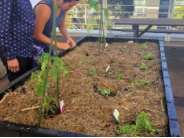
One of the great challenges of rapid urbanisation in the 21st century is keeping our cities liveable. We can do this by making our urban environment green through planting. In dense urban environments like UNSW, with limited with space, we must be innovative, growing plants in the gaps between buildings, as well as inside and on buildings. These plants can counteract urban heat islands, reduce energy costs, clean the air and increase occupant health.
Contact Us
If you would like to plant a garden bed on campus for teaching and research purposes, contact UNSW Urban Growers Team Lead, Assoc Prof Cathy Sherry. If you would like to get involved in caring for or using any of our gardens for academic purposes, contact your local Faculty representative to find out more.
Team Lead
Associate Professor Cathy Sherry
Arc@UNSW
ADA
Dr Joshua Zeunert
Engineering
Dr Veljko Prodanovic
Law & Justice
Professor Bronwen Morgan
Medicine & Health
Dr Sophia Lin
Science (BEES)
Professor Angela Moles
UNSW Wellbeing
Liza Poppert

